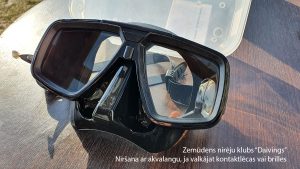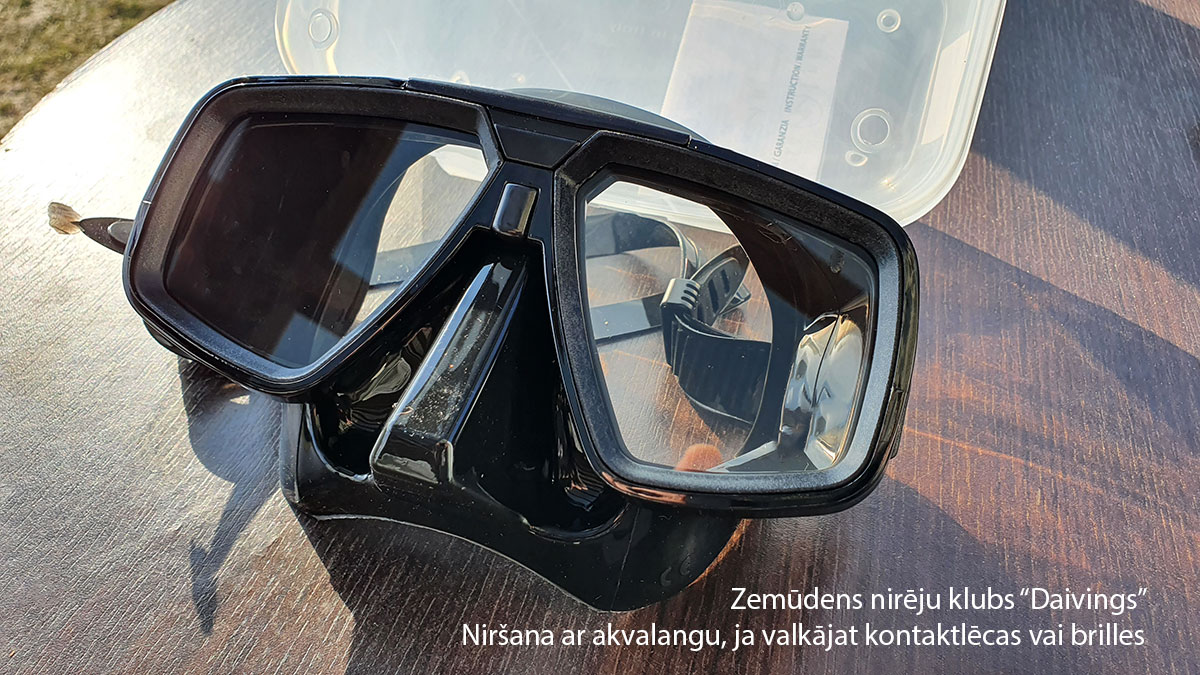Can you scuba dive or dive if you wear contacts or goggles? Of course! We have access to the two most popular options for divers to get underwater sight:
- Buy a scuba mask with optical lenses.
- Wear disposable soft contact lenses when scuba diving.
We'll explain both of the above in more detail below, but you should know: water improves your vision. Due to refraction, underwater objects appear to be 33% larger and 25% closer. If (like many diving club divers) you are a little short-sighted, you may not need corrective lenses during the dive.
The diving instructor of the Latvian Diving Club "Diving" will help you decide whether to wear contact lenses or a prescription mask while diving. During the diving test, check that you can read the air and depth gauges without glasses. If you don't see the numbers while scuba diving, you'll need to wear contact lenses or put on a prescription mask. Maybe choose a diver's computer and a manometer with larger numbers.
Table of Contents
Scuba diving with contact lenses
According to our colleagues from Divers Alert Network (DAN) Divers should ask their ophthalmologists or optometrists to prescribe "soft" contact lenses. It has been found that "hard" lenses or hard gas-permeable lenses sometimes cause symptoms of eye pain and blurred vision during and after diving. These symptoms are caused by the formation of gas bubbles between the cornea and the contact lens.
Contact lenses are helpful to see even when the mask is off. They also cost less than buying a diving mask, but wear out much faster.
Comparison of soft and hard contact lenses and scuba diving
- Hard contact lenses prevent the ingress of gases, which can cause blurred vision.
- Divers report that hard contact lenses make their eyes dry.
- Soft contact lenses are larger and are more likely to remain in the eyes if the mask is flooded (although rarely, this can happen).
How to Buy an Optical Goggle Mask for Scuba Diving
- The first and most important step is to buy a diving mask that is properly applied. A flood mask will drive you crazy with every dive.
An employee of the diving club "Diving" can help you choose the right mask that is suitable with optical lenses and is well suited for divers. An instructor can also help you get the right lenses. Most manufacturers use ground or laminated lenses, but some divers have high-index glass lenses. Your prescription will determine the type and strength of corrective lens you need, the most popular being -2, -3, -4.
Here's more information about optical diving masks provided by DAN experts: “Many high-quality diving masks may have optical prescription lenses installed, but not every diving mask is perfect for every recipe. The thickness of the corrective lens is a factor that determines the strength of the prescription, the surface area of the lens, and the decentralization (in non-optical terms, where the diver's pupil is in the objective versus the geometric center of the lens). High-plus spherical lenses are curved and extend toward the center of the diver's eye, so divers who require high-plus correction should move on masks with sufficient volume to ensure that the lenses do not touch the face.

Whichever option you choose, an optical mask or contact lenses
If your vision is severely impaired when you are not wearing contacts or goggles, always tell your instructor, diving colleague and / or diving guide. That way, if you lose your optical diving mask or your contact lenses fall out while diving, they can help. During the first lobe, before diving, decide on a "I can't see" signal and plan how you will work together to return to the water, boat, and so on.
Learn more about these diver training courses:
- EFR (Emergency First Response)
- PADI Adaptive Support Diver
- PADI Adaptive Techniques Specialist Diver
If you are looking for advice or help, contact and visit the diving club "Diving" or call the instructor at t.220-77-202to find the right help and go scuba diving.

